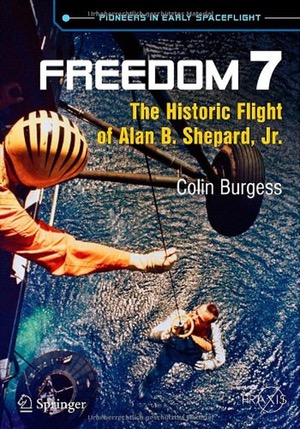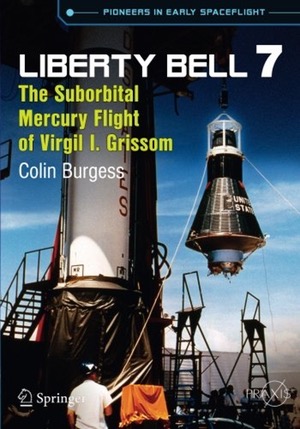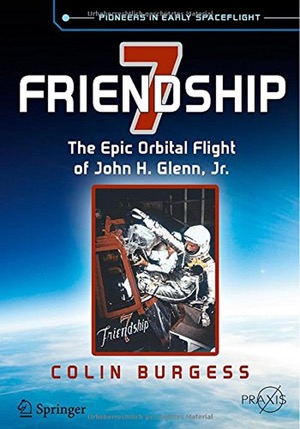Space guy From Down Under: An interview with Colin Burgessby Dwayne Day
|
| As someone who grew up in the exciting years of the race to the Moon, my greatest interest lies in that particular era of space travel. |
About this time there were two more major influences in life; I left my boring job as an office clerk and went to work at Sydney’s Daily Mirror newspaper, in the hopes of one day becoming a journalist (which never came to pass.) I loved the immediacy of working at a major newspaper, and I can still bring to mind the smell of printer’s ink as the workers put together that day’s newspaper. As well, I wrote to my favorite science fiction author, John Wyndham, letting him know that I was writing short stories and asking how I should expand this interest to one day writing books of my own. He replied, in and in his next couple of letters he set out encouraging me and explaining how I should go about my own burgeoning literary career.
In 1970, I joined Qantas Airways as a passenger handling agent, and two years later applied for a temporary transfer to the cabin crew section as a flight steward. I only intended flying for two years before resuming my career on the ground, but ended up staying in cabin crew for 30 years. The last 10 years were spent as a Flight Service Director and Customer Service Manager; basically an on-board manager responsible for the administration, safety, and welfare of the aircraft, passengers and crew.
In 1980, while on a 13-month basing with Qantas in London, I met a boyhood hero, Major Pat Reid, who wrote the classic escape book, The Colditz Story. During our talk at his home, I told him I enjoyed writing non-fiction articles for a small number of magazines, and he suggested I look at writing a book on the Australians who were POWs in the fabled Colditz castle prison. He inspired me to look at the subject and conduct interviews, and in 1985 my first book, The Diggers of Colditz (co-authored with Australian Colditz veteran Jack Champ), was published simultaneously in England and Australia. My next books were on the subject of the Australian POW experience, and then I turned my attention to writing on my other great interest of human space exploration. My first effort was a book aimed at school students, and was titled Space: The New Frontier. I then undertook to write a biography of Australian-born payload specialist, Dr. Paul Scully-Power. After that, there was no holding me back.
DD: You write a lot, so I can only assume that you enjoy it. What else do you do for fun?
CB: Apart from writing new books I am also the series editor for the University of Nebraska’s Outward Odyssey series of books, an exciting project now in its twelfth year. As well, I give talks on the subject of space history to local Probus and Rotary groups and schools, and for additional fun I run trivia quiz fundraising nights for different schools, charities, and sporting clubs. My wife Pat and I love touring the world, and especially enjoy cruising on the larger ships. We have just completed our second cruise through the Panama Canal.
 |
DD: So how do you do your research?
| I am looking forward to putting together stories on the flights of Wally Schirra aboard Sigma 7 and Gordon Cooper on Faith 7, as these latter two orbital missions have received far less coverage in the past and I want to explore new avenues in them. |
CB: As I am mostly interested in writing about the social or human side of pioneering space travel, I first make every effort to contact people who were close to the subject matter or person in order to record their stories and ask them questions. Often this proves difficult as many of them have passed on, so I then try to locate any contemporary media interviews with them. Over many years, beginning in my early teens, I managed to build up a rather large collection of newspaper and magazine clippings on each of the early manned space missions, and these have proved to be of enormous value when putting a story together. Another valuable resource is the NASA JSC Oral History program. But overall I would have to say that making multiple personal contacts is my principal goal in setting out any story, and this is certainly helped by being recognized as a published author with what I hope is a good reputation for writing with respect and keeping to the facts.
DD: How do you pick your subjects? I can guess that for the Mercury books they’re successful and so you’re doing them in sequence, but do you suddenly get interested in something and decide to chase after that sometimes?
CB: That is mostly true. As someone who grew up in the exciting years of the race to the Moon, my greatest interest lies in that particular era of space travel. I do try to write books on subjects that have not been fully explored before. In the case of the Mercury program books, or even the Outward Odyssey series, I try to put together a series that fully explores every facet of a flight or program, but in ways that have not been attempted before, and this is where fresh or untold anecdotal material from people involved in those stories is so crucial.
While I’ve enjoyed writing books on the first four and better-known Mercury manned missions, I am looking forward to putting together stories on the flights of Wally Schirra aboard Sigma 7 and Gordon Cooper on Faith 7, as these latter two orbital missions have received far less coverage in the past and I want to explore new avenues in them. As to where ideas come from, I have found that a simple conversation or message can trigger an idea or direction, which then begins to evolve in my mind over time before I commit anything to paper. It’s an ongoing process, and just when I feel I might have run out of ideas something will always come along to spark my interest, which I will then pursue.
DD: What do you read?
CB: Obviously I read a lot of books on spaceflight history, but as many hours of each day are devoted to writing on or researching that subject that I find I need to get away from it completely at times, and tend to flee to the area of crime fiction, and particularly books by such authors as Michael Connelly, Harlan Coben, and Brian Freeman. But my all-time favorite since my teen years has always been British sci-fi author John Wyndham, and I have read each of his wonderful books many times over the years.
DD: What do you want to read but nobody has written yet?
CB: I would love to see a book on the life and achievements of John Paul Stapp, who was engaged in so much vital aerospace research in the years leading up to the first manned flights, including perilous research riding on high-speed rocket sleds. He was an incredibly courageous and dedicated man who deserves to have his story told. And it is also high time we saw a long-overdue biography of astronaut Ed White.
 |
DD: Have you considered writing anything about non-astronaut subjects?
CB: Not really. I started out writing books on military subjects but later turned to the subject of space exploration and I really can’t see myself doing anything else.
DD: Do you see the space history field going in any particular direction? Is there some place you would like to see it go?
CB: At the moment I believe there’s something of a pause as we all await the next big development or initiative in human space exploration. Quite understandably, it seems everyone is concentrating on writing about things that have happened in the past, as our immediate future in space is so unpredictably vague and subject to change. But I expect that to change in the next few years once a whole new generation of rockets and spacecraft sends us out there on the next phase of space exploration. But a lot of what lies ahead at this time is simply unfunded speculation and all we can do is patiently play the waiting game.
DD: Are there any mysteries of space history that particularly intrigue you even if you don’t intend to write about them?
| Quite understandably, it seems everyone is concentrating on writing about things that have happened in the past, as our immediate future in space is so unpredictably vague and subject to change. |
CB: I believe that the full and true story of the Apollo 1 fire has yet to be told. While I do not subscribe to any of the fanciful conspiracy theories out there, I do believe from decades of listening to people close to the story that several crucial facts about the fire and the tragic deaths of the three astronauts have always been held back. But I believe it will be an ugly book to write, and not one I’m interested in tackling.
DD: What’s next for the Outward Odyssey series?
CB: The next two books are about to be released. Go, Flight: The Unsing Heroes of Mission Control, 1965–1992 is an account of those who worked in NASA’s Mission Operations Control Room (or MOCR). It is a tremendous book by Rick Houston and former Flight Director Milt Heflin. Then there is Jay Gallentine’s follow-on book to his brilliant Ambassadors From Earth. In this new book, Infinity Beckoned: Adventuring Through the Inner Solar System, 1969–1989, Jay ushers us through an amazing period of space activity when robotic spacecraft were landing on and exploring our nearby heavenly neighbors.
Beyond this, there is a book by Jay Chladek currently undergoing the editing process on the history of space stations, an autobiography by pioneering payload specialist Charlie Walker, and yet another revealing astronaut autobiography that will surprise and delight fans of the Apollo era. We are keeping news of this close to our chest at this time, but all I can say is that it was written by an astronaut who is no longer with us and the manuscript was only recently discovered in his papers. So I’m afraid I’m going to end the interview on a bit of a tease.
DD: Thank you.
